Do you really Understand how to Understand?
Before you instinctually say yes, I would love to share a story about Richard Saul Wurman.
Richard is more than a mentor and a friend. He is truly an icon of the digital age.
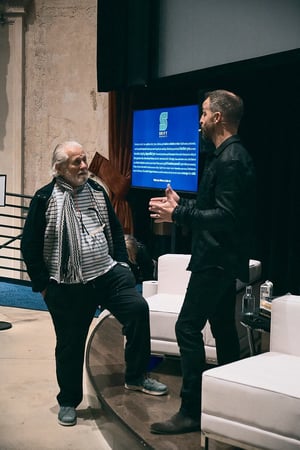
In 1984, he founded the TED conference and foresaw how the convergence of technology, entertainment, and design would define the next generation of human advancement.
One of my favorite parts about the TED innovation story is how Richard subtracted what he didn’t think was needed: the podium, the hour-long talk, and any form of PowerPoint.
(One of the main reasons I went sans PowerPoint for my TEDx talk last year.)
As an architect by trade, he has come to understand how to program, not just buildings, but the human mind.
He marches not just to his own beat, but one that doesn’t even sound familiar to the majority of us who are living a life on someone else's terms.
More impressive, to me anyway, is that at 87, he has written 91 books.
He would say all 91 of those books are about the same subject – understanding.
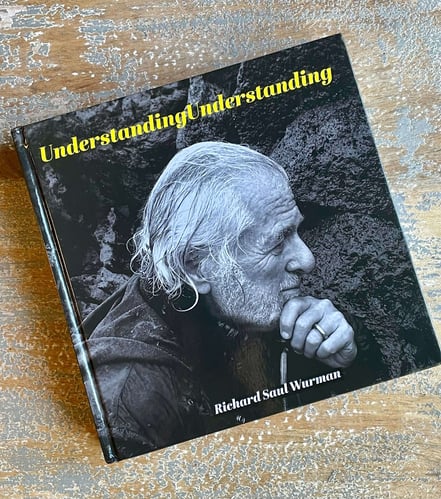
And good luck trying to find one of these books. Richard always self-published before it became cool, and most of his books are out of circulation.
From my perspective, Richard has been speaking, writing, creating, painting, sculpting, and thinking for an audience of one most of his life – himself.
My Journey With Understanding.
We met in 2015. I was fortunate to be invited to lunch by a good friend of mine, Yanik Silver, who bid on a charity auction for the chance to sit with the icon.
I jumped at the chance but honestly wasn’t sure what you talk about with a guy who has lived this way, done this much, and might be above my paygrade, so to speak.
Right from the start, Richard appeared distracted, as if he couldn’t slow the many thoughts running through his mind. To get ready to not miss a word, idea, or thought from Richard, we pulled out our journals to get ready to capture the experience and a couple of his iconic words. He demanded we put them away.
I was like, OK… this is going to be an interesting experience.
“Writing notes, research shows, helps reinforce memory,” my friend, Yanik, defended.
“Life shows me that’s bullshit,” Richard answered. “Learning is remembering what you’re interested in.”
We chewed our breadsticks slowly, digesting his words.
“Everything you need to know from this lunch, you’ll remember,” he explained. “You won’t forget a thing you were interested in.”
What started out rough and surly ended 4+ hours later in a really amazing experience.
Richard chipped away our conditioning like Michelangelo’s quote about David, “I just removed what didn’t belong.” That’s how I think about Richard in many ways. He has a more honed bullshit intuition than most.
After lunch, he gave us a tour of his home and all I could think about was, “I would love to listen and learn from this guy for hours.”
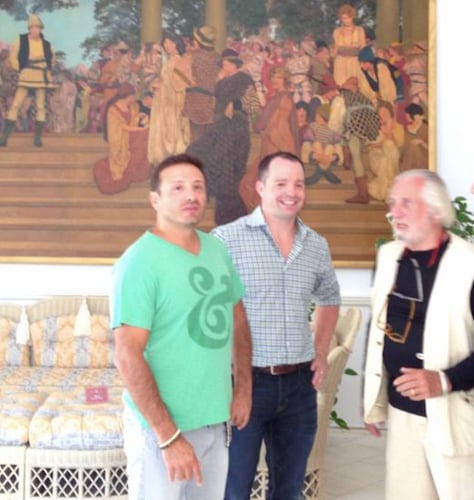
In typical Mechlinski fashion, I wanted to hit the MORE button.
But, like most things in life, there is a beginning and an ending.
We left Richard that day. I sent a series of handwritten thank you notes and, for once, thank goodness for Facebook, we became “friends” there.
Over the next few years, I would continue to stay in contact with Richard on social media, buying a few of his books, most notably 33, which was a mind-bender.
And then, in 2017, he started to post about his 90th book, UnderstandingUnderstanding.
I sent him a note and said, ”Is there anything I can do to be supportive of the launch?”
He laughed a bit, asked for my number, and then called me.
It was a bit of a surreal experience, talking with this guy over the phone about this book. It also just happened to be at the same time my company, entreQuest at the time, was changing our name and vision to SHIFT. In fact, I hired a shaman to come out to help us do a closing ceremony for entreQuest, so we could give a proper send-off to our first baby.
Fast forward to our first big event in one of our businesses – SHIFT Society.
I had this idea that instead of having speakers talk about something they knew about or were an expert in, could we take a page out of Richard’s book (pun intended), give the members something to speak on for nine minutes (half the TED time) and see how going from “not knowing to knowing” felt.
At first, the members were reluctant, but that’s when I called in the big gun – Richard.
I asked Richard to be our speaker on Zoom. (Yes, it’s funny to think about Zooming in as a keynote speaker in 2017, but we did it.)
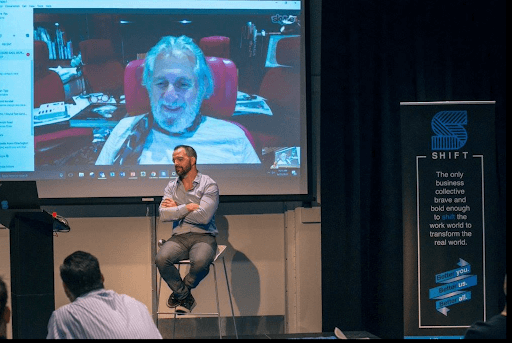
The event was a massive success. Members still talk about it to this day. Having to stand and deliver to a group of people you respect about a novice topic – to go from not knowing to understanding – was a hit.
And Richard showed up… on Zoom and did a great job!
Check out Richard's full session and what the members said here.
Then This Happened...
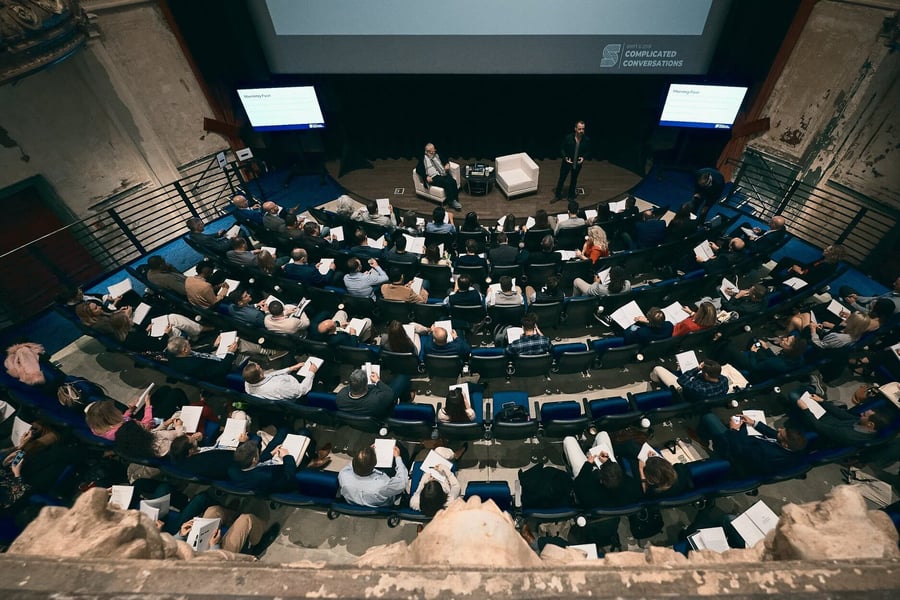
OK, last bit. In 2019, in response to what felt like the world falling apart, we hosted another big event with 153 entrepreneurs from all over the country. We designed the gathering with the understanding that we need to stay in conversation about some really big, complicated, taboo subjects like death, social issues, climate change, AI, religion, and others.
The event was called Complicated Conversations, and the first subject we were going to hit was mortality. Yes, four months before the pandemic… weird timing, I guess.
This time, Richard flew up from his new home in Florida and was super gracious with his time. We had dinner the night before with my dad, wife, Erica, and a few other good friends.
And Richard did nothing but engage everyone in thoughtful dialogue.
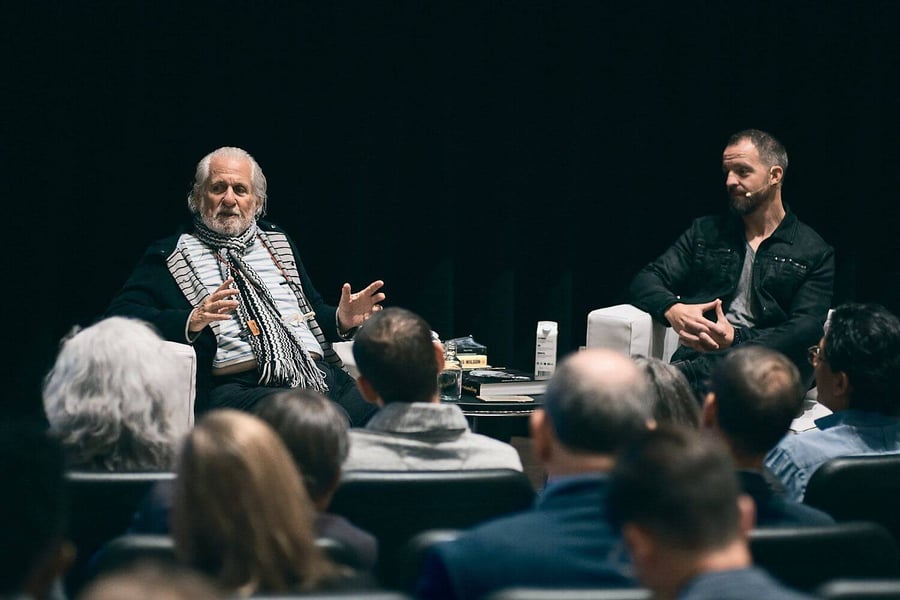
He wasn’t for everyone at the event, but isn’t that true for us all when we are not trying to please or make everyone else happy?
Here's What I Understand Today.
So how have I integrated what I have learned from Richard?
Give yourself permission not to know.
We don’t give ourselves permission to be ignorant. And ignorance is an ideal state from which to learn.
In UnderstandingUnderstanding, Richard says “the most essential prerequisite to understanding is to admit you don’t understand.”
Yet instead, we all walk around hiding the same imposter syndrome in the pockets of our suit jackets, hoping yours isn’t the one that peeks out from your lapels. We pretend to understand because it feels more comfortable and safe.
Learning without interest is just data. In order to commit it to memory, we need to make the connection between the information and what makes it worth remembering. And in order to do that, we need to live in the discomfort of unknowing. We need permission to be ignorant. We can’t make real change without clarity.
What is the first thing we do when we feel tired, overwhelmed, burnt out, and bored? Turn to our devices.
We mindlessly scroll social media, skim emails, and try to convince ourselves that the frenetic pace of life justifies our obsessive impulse for more, more, more.
Would you continue filling a mug with coffee if the liquid caffeine already reached the top? Would your body physically allow you to continue to consciously pour if it saw a spill was imminent?
Then why do we consciously overflow our minds? What unconscious barriers do we routinely blow past and ignore?

We never feel content with enough. We always crave more.
It goes back to our earliest understanding of understanding.
Information overload gives us this false pretense that we are informed and well-educated. We don’t have an education system; we have a memorization system. And that way of thinking stays with us as adults who are fed information and believe it to be true simply because it lives on a page.
Our memory isn’t even that reliable. Recall requires a genuine interest in logging the information alongside our lived experience and perception of the thing itself.
The real problem here is we aren’t taught to think critically. No one teaches us to really analyze information and develop an interest in its purpose so we can fully commit the entire spectrum to memory.
True understanding requires three necessary components working harmoniously. As Richard Saul Wurman in his book, UnderstandingUnderstanding, says, “Learning, interest and memory are the tango of understanding.”
How does this show up in your business?

Seventy percent of workers think they aren’t good at their jobs, aren’t passionate about their jobs, or don’t believe the work they are doing is impactful or meaningful.
If people aren’t learning how to be better, they lack interest and they aren’t attuned to their purpose, what does that tell us about the American workforce?
They don’t truly understand why they are doing the job they do.
As leaders, let’s understand so we can help our employees do the same.







